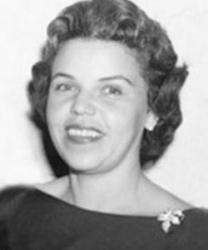Women’s History Month: Celebrating Marjorie McKenzie Lawson
In celebration of Women’s History Month, the Office of the Attorney General (OAG) is recognizing some of the trailblazing women in law who have laid the foundation for the next generation of young female lawyers.
Marjorie McKenzie Lawson
Marjorie McKenzie Lawson broke new legal ground for women in the District and across the country, serving as the first black female judge in D.C. and the first black woman appointed to the Juvenile Court bench by a president. However, her road to success was not easy. After growing up in Pittsburgh and earning a degree from the University of Michigan, Lawson moved to the District to attend Terrell Law School, an African-American law school that offered evening classes from lawyers who volunteered their time as instructors. She earned a law degree from Terrell, but it did not open the career doors she hoped it would. When Lawson lost out on a job to an Ivy League graduate, she decided to go back to law school for a second time and earned another degree from Columbia Law School so that no one would ever doubt her qualifications again.
After returning to the District, Lawson gained prominence on the D.C. political scene through her work with the Civil Rights Movement. Lawson worked on urban renewal projects that served African-American residents and extensive real estate development involving federally subsidized housing. Lawson’s work and political connections caught the attention of the John F. Kennedy presidential campaign and she was selected to serve as the campaign’s civil rights director. In this role, she was able to connect Kennedy with civil rights leaders across the country and helped him win key endorsements. Her hard work earned her a spot on the President's Committee on Equal Employment Opportunity and she served as vice chairman of the District Crime Commission. Later, President Kennedy appointed Lawson judge to the Juvenile Court where she worked to improve the lives of youth—particularly black youth—in the District.
Like Lawson, AG Racine is committed to using the law to help young people. As an alternative to prosecution, OAG launched the nation’s first in-house Restorative Justice program in a prosecutor’s office. Restorative justice uses mediation to empower victims to express how they were affected by crime and require offenders to accept responsibility and take action to repair the harm they caused. Nationwide statistics show restorative justice programs have better success than traditional prosecution at rehabilitating offenders, increasing victim satisfaction, and lowering costs. In 2018, OAG’s program was recognized with the prestigious Cafritz Award, an honor given for outstanding service by District government employees. Seen as a national leader in these efforts, OAG is working with prosecutors’ offices around the country to help them establish their own restorative justice programs.

